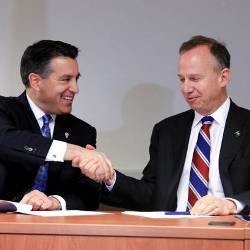Delaware iPoker Hits Record Low in September 2015

Delaware has just 935,000 residents, making it the USA’s 6th smallest state in terms of population. Therefore, it was always going to be a struggle for The First State to maintain a competitive iPoker industry, especially as poker is a peer-to-peer game which requires a critical threshold of liquidity in order to survive, unlike other casino games which are played against the “house”.
Even by its own lackluster standards, however, Delaware’s latest iPoker results were still disappointing with revenues falling to their lowest levels to date of just $24,523, a full 27% less than the $32,305 that was generated in September last year. That’s slightly less than the previous low set by the state of $25,607 in June 2014, although that was before Nevada and Delaware enacted their landmark liquidity sharing agreement (photo) which analyst touted as a potential game-changer for the industry.
iPoker Down, iGaming Up
In September, the state’s three casinos with internet poker sites produced $24,523 in revenues. Leading the market was Delaware Park with $16,070 of that tally, followed a way back by Dover Downs with $4,621, and Harrington Raceway with $3,830. While Delaware’s iPoker results reflect a wider malaise in the global iPoker industry, so too does the state’s overall iGaming results which continued to grow last month. Including video lottery and casino games, as well as poker, revenues came in at $156,125, marking a 7.3% increase over the $145,022 collected in September 2014. Accounting for much of the gains was the increasingly popular video lottery vertical, which generated impressive revenues of $93,737 in September.
New Sign-Up Numbers Improve
A total of 330 players signed-up for new online gambling accounts in September, with Delaware Park accounting for the bulk of that figure, or 142 people. Furthermore, that total was an improvement on the average of 302 players who join each month, as well as being the second highest tally of the year thus far.
Nevada/Delaware Compact Not Enough
After adopting regulation, the states of Nevada and Delaware soon realized that they would have to pool their players if they were to attract players to their virtual tables. Unfortunately, New Jersey with a state population of almost 9 million people felt in a less desperate situation than the USA’s other two regulated markets, whose combined population totals roughly 3.8 million. Nevertheless, Nevada Governor Brian Sandoval and Delaware Governor Jack Markell expressed great optimism that not only would their interstate compact yield great results, but that it would also inspire other states to join the online poker bandwagon. As Gov. Sandoval explained at the time:
“We’re standing in a moment of history today. We hope [the compact] will serve as a model for multistate collaboration and that other states will see the benefits of the agreement and soon decide to join for themselves.. We are two small states – but we’re two proud states and we can set a shining example of how to do this.”
Unfortunately, the USA still has just three regulated iPoker markets, while Nevada/Delaware’s interstate compact has also failed to yielded any significant results, with a mere 160 cash game players recorded across both states over a 7-day period, according to the latest report by PokerScout.
Federal iPoker Legislation Unlikely
Since 2011, when the US Department of Justice dismantled the country’s thriving unregulated iPoker industry, interest groups such as the Poker Players Alliance (PPA), have championed efforts to get either federal or state level legislation passed. The UIGEA was then reinterpreted to permit individual states to determine their own stance on iGaming, which while a success still left a fragmented iPoker landscape in desperate need of rebuilding from the ground up. Needless to say, a federal solution would have facilitated a quick transition to a unified iPoker industry, but now the best hope for US online poker players involves the arduous and slow process of individual states passing regulation, even though most do not have the populations to make such endeavors profitable.
Best Hope State Initiatives
The best hope for the country’s online poker industry going forward is that other states will soon start embracing regulation of their own, subsequently raising the prospects of a shared collaborative network springing up between individual states across the US. Without a doubt, California with 38.8 million people would set a good example for other states in this regard, as would other likely candidates such as New York (19.7m), and Pennsylvania (12.8m).









